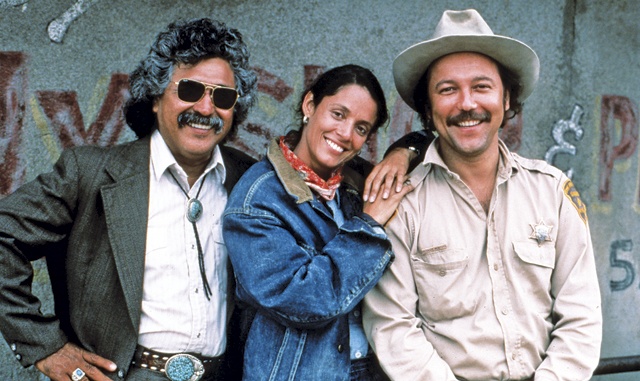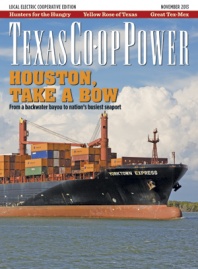If you were listening to your car stereo in Texas in the mid-to late 1970s, you could hardly drive 30 miles in any direction without hearing Freddy Fender. If you stopped at a café or bar with a jukebox on any stretch of road in any corner of the state, an hour could barely pass without Fender earning it a quarter.
His rendition of “Before the Next Teardrop Falls” hit No. 1 on Billboard’s “The Hot 100” on May 31, 1975. His “Wasted Days and Wasted Nights” later that year was a bit of eight-track tape gold that helped carry AM radio during its last stretch of musical relevance. His clear, emotive tenor was unmistakable, and his Chicano Afro and mustache were instantly iconic.
Fender was born Baldemar Huerta in the El Jardin barrio of San Benito in the Rio Grande Valley on June 4, 1937. His father died of tuberculosis when he was 7, and he and his mother became migrant workers.
At an age when most kids were navigating grade school, Huerta was harvesting beets in Michigan, picking cucumbers in Ohio, baling hay in Indiana and picking cotton in Arkansas. Besides the hard work, what he remembered most about the period was the soulful music of African-American field workers. He was given a busted guitar when he was 10 and practiced tirelessly, so much that he soon made his first public appearance, singing “Paloma Querida” on KGBT-AM in Harlingen, a city near San Benito. His mother, recognizing Huerta’s passion, bought him a new guitar. Huerta mastered it quickly and began entering and winning talent shows in the Valley.
In 1953, Huerta began a three-year stint with the Marines. When he returned to Texas, he married and threw himself into his music, playing beer joints and honky-tonks throughout the Valley. He auditioned for Falcon Records in McAllen in 1956 and was offered a contract. His first session produced “No Seas Cruel,” a Spanish version of the Elvis Presley hit “Don’t Be Cruel.” The B-side was a Huerta original called “Ay Amor.” Falcon marketed Huerta as El Bebop Kid, and “No Seas Cruel” became a hit in Mexico and South America.
He “was the first one to cross the bilingual line,” says Joe King Carrasco, the current “king” of Tex-Mex rock ’n’ roll who looked up to Fender while growing up in Dumas. “He’s what Texas music is all about.”
In 1959, Huerta signed with Imperial Records. He had failed to reach a broader audience in the United States, so he changed his name to Freddy Fender, taken from the brand of his favorite guitar. Soon after, he was separated from his wife for a time, and one evening at the Starlight Lounge in Harlingen, he immortalized his feelings in a song called “Wasted Days and Wasted Nights.” It became a regional hit in 1960, and Fender began touring.
Shortly into the tour, Fender’s career was curtailed by his arrest for possession of marijuana in Louisiana. He and a bandmate were each sentenced to five years in prison. In 1963, Louisiana Gov. Jimmie Davis, a successful blues, country and gospel recording artist in his own right—famous for composing “You Are My Sunshine”—paroled Fender. Any steam Fender’s career had picked up in 1960 was shot, but he joined the New Orleans music scene. Over the next few years, he worked with future legends such as Art and Aaron Neville.
Fender returned to the Rio Grande Valley in 1969. He continued to perform, but he also took a job as a mechanic and began studying sociology at Del Mar College. Five years later, Fender attempted to cut a rhythm and blues album at Crazy Cajun Studios in Houston. His producer, Huey Meaux, suggested he give a country ballad called “Before the Next Teardrop Falls” a try. Fender wasn’t interested, but Meaux insisted. Fender acquiesced and gave the song one obligatory run-through, changing some of the English lyrics to Spanish.
Meaux released Fender’s take of “Before the Next Teardrop Falls” in January 1975. Within months, it was a smash hit. Meaux decided to strike again while Fender’s career was hot. They re-recorded “Wasted Days and Wasted Nights” and it, too, blazed up the charts, reaching No. 1 on the country charts and No. 8 on the pop charts. Fender was an international recording sensation overnight, and by the end of 1975 his bilingual country ballads won him Country Music Association nominations for single of the year, album of the year and male vocalist of the year. “Before the Next Teardrop Falls” won single of the year.
Fender had several other hits before the ’70s ended. In the late ’80s and early ’90s, he played in the Texas Tornados, a supergroup that included Flaco Jimenez, Augie Meyers and Doug Sahm. They won a 1990 Grammy for best Mexican-American performance. He won a 1998 Grammy in the same category as a member of another supergroup, Los Super Seven. And he won the 2001 best Latin pop Grammy for his last studio album, “La Musica de Baldemar Huerta.” In between, he found time to act in “The Milagro Beanfield War,” perform for three presidents and receive a star on the Hollywood Walk of Fame.
Fender’s health began to decline rapidly. He received a kidney transplant in 2002 and a liver transplant in 2004 but then was diagnosed with lung cancer. Fender died in Corpus Christi on October 14, 2006, and was buried in San Benito.
In a career spanning six decades, Fender introduced Latin America to rock ’n’ roll, rock ’n’ roll to Chicano, and country to conjunto. He might have sprung from a San Benito barrio, but his timeless ballads were gentle salve for aching hearts from the high-rises in Houston to the flatlands of West Texas, cowboy or vaquero, rocker or Tejano.
“His music came from his roots and he expanded from there.” Carrasco says. “He was the real deal. He had a great voice, he was great on the guitar, he could do Tex-Mex, rock, blues—he could do it all.”
——————–
E.R. Bills is a writer from Aledo.


